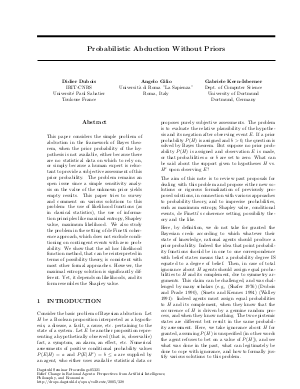Probabilistic Abduction Without Priors
Authors Didier Dubois, Angelo Gilio, Gabriele Kern-Isberner
-
Part of:
Volume:
Dagstuhl Seminar Proceedings, Volume 5321
Part of: Series: Dagstuhl Seminar Proceedings (DagSemProc) - License:
 Creative Commons Attribution 4.0 International license
Creative Commons Attribution 4.0 International license
- Publication Date: 2005-11-21
File

PDF
DagSemProc.05321.13.pdf
- Filesize: 200 kB
- 8 pages
Document Identifiers
Subject Classification
Keywords
- Conditional probability
- Bayes Theorem
- imprecise probability
- entropy
- possibility theory
- maximum likelihood
Metrics
- Access Statistics
-
Total Accesses (updated on a weekly basis)
0Document
0Metadata
Abstract
This paper considers the simple problem of abduction in the framework of Bayes theorem, i.e. computing a posterior probability of an hypothesis when its prior probability is not available, either because there are no statistical data on which to rely on, or simply because a human expert is reluctant to provide a subjective assessment of this prior probability. The problem remains an open issue since a simple sensitivity analysis on the value of the unknown prior yields empty results. This paper tries to survey and comment on various solutions to this problem: the use of likelihood functions (as in classical statistics), the use of information principles like maximal entropy, Shapley value, maximum likelihood. We also study the problem in the setting of de Finetti coherence approach, which does not exclude conditioning on contingent events with zero probability. We show that the ad hoc likelihood function method, that can be reinterpreted in terms of possibility theory, is consistent with most other formal approaches. However, the maximal entropy solution is significantly different.
Cite As Get BibTex
Didier Dubois, Angelo Gilio, and Gabriele Kern-Isberner. Probabilistic Abduction Without Priors. In Belief Change in Rational Agents: Perspectives from Artificial Intelligence, Philosophy, and Economics. Dagstuhl Seminar Proceedings, Volume 5321, pp. 1-8, Schloss Dagstuhl – Leibniz-Zentrum für Informatik (2005)
https://doi.org/10.4230/DagSemProc.05321.13
BibTex
@InProceedings{dubois_et_al:DagSemProc.05321.13,
author = {Dubois, Didier and Gilio, Angelo and Kern-Isberner, Gabriele},
title = {{Probabilistic Abduction Without Priors}},
booktitle = {Belief Change in Rational Agents: Perspectives from Artificial Intelligence, Philosophy, and Economics},
pages = {1--8},
series = {Dagstuhl Seminar Proceedings (DagSemProc)},
ISSN = {1862-4405},
year = {2005},
volume = {5321},
editor = {James Delgrande and Jerome Lang and Hans Rott and Jean-Marc Tallon},
publisher = {Schloss Dagstuhl -- Leibniz-Zentrum f{\"u}r Informatik},
address = {Dagstuhl, Germany},
URL = {https://drops.dagstuhl.de/entities/document/10.4230/DagSemProc.05321.13},
URN = {urn:nbn:de:0030-drops-3286},
doi = {10.4230/DagSemProc.05321.13},
annote = {Keywords: Conditional probability, Bayes Theorem, imprecise probability, entropy, possibility theory, maximum likelihood}
}
